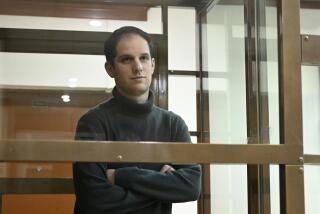Gorbachev, Kennedy Discuss Arms Cuts
- Share via
MOSCOW — Soviet leader Mikhail S. Gorbachev told Sen. Edward M. Kennedy (D-Mass.) on Thursday that the next Soviet-American summit must produce practical results in arms control or it would make no sense.
Gorbachev’s view was reported by Tass, the official news agency, after Kennedy met with the Kremlin chief on nuclear disarmament and other issues.
Mere recognition of the danger of a nuclear war no longer is enough, Gorbachev was quoted by Tass as telling his American visitor.
Gorbachev agreed at last November’s summit meeting with President Reagan in Geneva to hold a second meeting this year in the United States. No date has been set for the second summit, however.
Guest of Parliament
Kennedy, who was a presidential contender in 1980 but has taken himself out of contention for the 1988 race, is on a three-day visit to Moscow as a guest of the Soviet Parliament. He told reporters in advance he would not comment in Moscow on the meeting with Gorbachev.
Before meeting Gorbachev, the senator praised exiled nuclear physicist Andrei D. Sakharov at a meeting with scientists, where he also said that the United States and the Soviet Union are on the verge of a “decisive breakthrough” in arms control.
Kennedy saluted Sakharov, who was banished to the city of Gorky in 1980 after years of campaigning for human rights causes, during a talk at the elite Academy of Sciences.
Sakharov, who won the Nobel Peace Prize in 1975 but is now almost never mentioned in the Soviet Union, has kept his membership in the academy despite his removal from Moscow.
Regarded as Dissident
Soviet officials, however, regard him as a dissident although it was his work on nuclear weapons that helped to make the Soviet Union a superpower.
During his talk, Kennedy first praised the controversial award of the 1985 Nobel Peace Prize to an international group of doctors seeking to prevent nuclear war.
The group is co-chaired by Dr. Yevgeny Chazov, a Kremlin physician who once signed a petition criticizing Sakharov for his human rights activities.
Then he added, “And I also pay tribute here to another eminent Nobel laureate, the first Soviet citizen to receive the Nobel Peace Prize, a member of your academy, Dr. Andrei Sakharov.”
“The indispensable value of science is its ability to speak truth to (those in) power,” Kennedy said in an apparent reference to Sakharov, now forced into silence by his exile in a city, 250 miles east of Moscow, that is closed to foreigners.
Academy President Anatoly P. Alexandrov, in an impromptu response, briefly mentioned Sakharov’s contribution to the development of the Soviet Union’s nuclear weapons.
Kennedy also appealed to scientists of both the United States and the Soviet Union to cooperate in ending the arms race.
More to Read
Sign up for Essential California
The most important California stories and recommendations in your inbox every morning.
You may occasionally receive promotional content from the Los Angeles Times.













